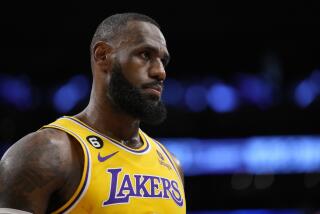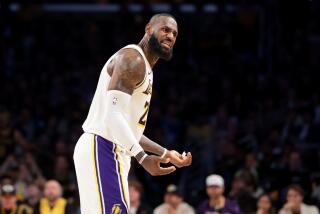League Has Put Itself in a No-Win Situation
There are stories of reconciliation and coexistence throughout the news these days. A peace accord for the Middle East. Dominique Moceanu and her parents make up. The New York Yankees have won two championships in three years--with the same manager.
The only group struggling to get with the program is the NBA, the league that used to be on the cutting edge.
The owners and players are talking, which is a step forward. But they didn’t think ahead.
Even though they might be able to reach an agreement that would save the season, they can’t save face.
They should have held marathon negotiating sessions a month ago, and maybe they’d be in training camp by now.
The boast that the NBA was the only league that hadn’t missed a game because of labor strife is gone. The scheduled opening night will come Nov. 3, and the arenas will be dark and empty.
Even if every game could be made up, the NBA can’t replace the benefit of the doubt it once enjoyed.
These folks are willing to ruin what used to be the best success story in professional sports while quibbling over something as small as 5.2%.
Granted, 5.2% of a $2-billion industry is a good chunk of money. But is it really worth throwing away the whole pie over what amounts to a few crumbs for the wealthy people involved?
Once the percentage of basketball-related income devoted to player salaries rose above 51.8%, the owners had the right to reopen the collective bargaining agreement. The league said the players received 57% of the money last season and couldn’t wait to lock them out to keep it from ever happening again.
So now we have to miss games and hear gloomy forecasts about the dire straits of the owners. If the salaries had come in at 51.7% of the revenue, this wouldn’t even be an issue.
The NBA had something that was working. It didn’t suffer from the same big-market, small-market disparity that has turned major league baseball into a battle of checkbooks more than a test of skill.
In the ‘90s, smaller outposts such as Utah and Portland have made the NBA finals two times apiece. The Indiana Pacers came within a game of the finals three times. That might not be a television executive’s idea of good news, but it’s a positive statement about the health of the league.
If player salaries threatened the NBA’s future, then it was the mistakes of a few owners that put them in danger.
The Larry Bird exception--the clause that allowed teams to re-sign their free agents for any dollar amount--was a good thing that was abused. It was meant to keep stars from hopping between teams, not guarantee millions of dollars to players who weren’t worth it.
Owners need to stop spending themselves into oblivion. And if they’re so concerned about rising costs, they should do something to put a drag on the escalating coaches’ salaries. Nobody comes to games to watch the guys in suits.
In return for some restraint on the owners’ part, the agents need to realize that just because a player happens to be the best player on a franchise, it doesn’t mean he automatically deserves to be paid like a franchise player.
Some form of the Bird exception should be included in the next collective bargaining agreement. However, one of the criteria for using the Bird exception ought to be that the player actually merits mention in the same sentence with Bird.
Or the player has won a championship.
Or even a playoff game, something Kevin Garnett and Juwan Howard had yet to accomplish before they signed their mega-contracts worth a total of $231 million.
Some of the ideas being kicked around in negotiations would prohibit such lavish gifts or at least curtail them. There also are some solutions to help the middle-class, veteran players--the real losers in the old system, no matter how much the owners cried.
But the owners don’t appear to be in line for a hard salary cap, which was supposed to be the reason they started this lockout. If it ends and they don’t get it, what was the point?
They could have canceled the season and probably won their battle, but at too high a cost.
Now the league probably won’t win on the economic front and can’t win on the public relations front.
It used to be whenever a potential labor dispute loomed on the horizon, it was easy to think it would be resolved because the NBA folks weren’t as dumb as their counterparts in baseball and hockey.
Now we’ve found out they’re even dumber, because the NBA didn’t learn from the mistakes of others.
Would a few weeks missed in November undo every bit of progress the league made over the past 20 years in the fans’ eyes? Not likely.
What has been lost for good is any sort of trust, any reason to believe the league really cared about the legions of fans who bought season tickets and replica jerseys.
The league announced Wednesday that all of the November games have been scratched.
However, if the two sides can reach an agreement in the next few days, and if Michael Jordan decides to come back, the Chicago Bulls are scheduled to play the Clippers at the Sports Arena on Dec. 1. How would that be for an enticement to watch the league again?
Unfortunately, such optimism has no place in today’s NBA.
More to Read
Go beyond the scoreboard
Get the latest on L.A.'s teams in the daily Sports Report newsletter.
You may occasionally receive promotional content from the Los Angeles Times.










